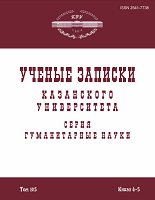Роль присяги при вступлении иностранцев в русское подданство (XV – начало XX века)
The Role of the Oath Taken by Foreigners for Becoming Naturalized Russian Citizens (from the 15th to the Early 20th Century)
Author(s): I. K. VoroninSubject(s): Cultural history, Social history, 15th Century, 16th Century, 17th Century, 18th Century, 19th Century
Published by: Казанский (Приволжский) федеральный университет
Keywords: subjects of the monarch; oath; vow; cross kissing; sworn statement; public service; foreigners; Russian subjects;
Summary/Abstract: This article considers the role of the oath of Russian citizenship as confirmation that foreigners become naturalized as Russian citizens. The concepts of “cross kissing”, “cross-kissing record”, and “oath” are examined in relation to the procedure of citizenship acquisition in Russia from the 15th to the early 20th century. Particular emphasis is placed on the genesis of the essence and scope of the oath institution in Russia. A comparative analysis is performed on the oaths taken by foreigners to assume the positions of public officials and subjects of the Russian emperors. The obtained results show that the change of citizenship did not entail compulsory religious conversion as long as the 17th century. All applicants for Russian citizenship had the right to take the oath in their native language and in front of the clergy member representing the religion they professed. As the oath of citizenship gained legitimacy and popularity in Russia, the lawmakers tried to unify the procedure, while ensuring that the oath text and ceremony remain sacred.
Journal: Ученые записки Казанского университета. Серия Гуманитарные науки
- Issue Year: 165/2023
- Issue No: 4-5
- Page Range: 113-124
- Page Count: 12
- Language: Russian

